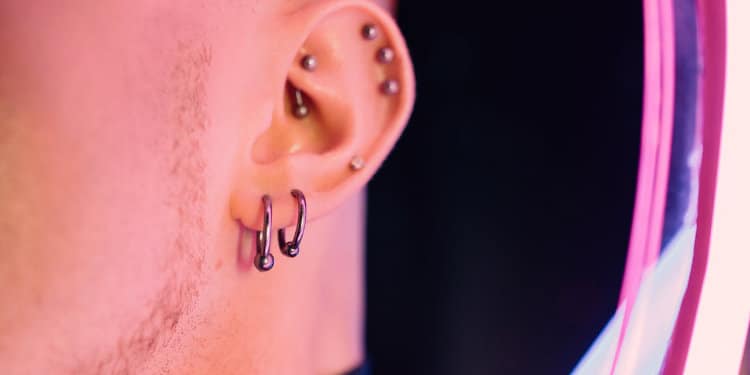










Piercings are incredibly popular and prevalent in today’s culture. People engage in piercing for various reasons, such as self-expression, artistic appearance, or for religious and cultural purposes. One popular trend is the piercing of the daith, which is believed by some to alleviate anxiety and migraines. The daith is a tiny piece of inner cartilage that folds above the eardrum and lies in one’s inner ear. While some may pierce it for style or self-expression, others do it to tap into the benefits of acupuncture. Although there is no actual clinical evidence proving its effectiveness, there are some scientific explanations for why daith piercing may help with symptoms of anxiety.

For daith piercing to be successful, the piercing must be located at the precise point said to have calming effects. Daith piercing is a fairly new procedure performed at tattoo and piercing establishments and is conducted with a specialized, hollow needle.
Some people claim that daith piercing employs acupuncture techniques. Acupuncture needles work to release energy that is blocked in the body. Acupuncturists and practitioners of holistic medicine target various pressure points to stimulate the nervous system, which is believed to initiate a relaxation response. One of these pressure points is the daith, which is located in a region of the ear that when stimulated, whether via a needle or in this case a piercing, is theorized to ground and induce calm.
Some have theorized that obtaining a daith piercing will put continuous pressure on the vagus nerve, which is the longest of ten nerves that stretch from the base of the brain to the rest of the body.[1] Daith piercings are located in approximately the same location that acupuncturists use to treat migraines. Thus, it is postulated that daith piercing can be utilized to prevent anxiety and migraines since the piercing is permanent and puts constant pressure on the vagus nerve.
Proponents of daith piercing believe that it can permanently ease and improve anxiety. However, there is currently no formalized research or clinical trials to prove that daith piercings do alleviate anxiety. Western medicine attributes any anxiety-reducing effects of daith piercing to be explained by a release of endorphins, enhanced blood circulation, or a decrease in muscle tension.
Other theorists hypothesize that perhaps a placebo effect is at play, meaning that daith piercing might alleviate anxiety because individuals simply believe it to do so.[2] Despite this, research has shown that acupuncture to treat migraines and anxiety is more effective than the placebo effect.[3] The means of piercing is somewhat similar to acupuncture, so if daith piercing is successful, it is likely because the same mechanisms are at play.
There is some risk in obtaining a daith piercing. Daith piercings are piercings of the cartilage, which can be painful. Cartilage piercing can take a longer time to heal and daith piercing is no exception. The piercings can take approximately five to twelve months to heal and have a higher propensity for infection when compared to piercings in the ear lobe. If infections are not addressed, they can lead to hearing loss. If a daith piercing is allowed to close, it will not completely vanish, as a permanent mark will always be visible.
As daith piercing is not clinically proven to reduce anxiety, one must weigh out the possible risks to the potential benefits.[4] In addition, it’s worthwhile to keep in mind, that even if it does appear to relieve symptoms of anxiety, daith piercing should not be viewed as a replacement for more conventional treatments, such as lifestyle changes, practicing mindfulness, and professional counseling.
Those whose anxiety interferes with their daily functioning are strongly encouraged to seek professional help rather than completely relying on somewhat helpful methods, yet still unproven. There are a variety of well-accepted forms of therapy for dealing with anxiety, both traditional and alternative forms of treatment that have proven to be effective.
References